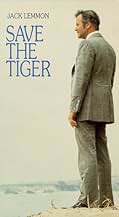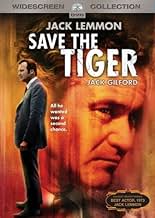अपनी भाषा में प्लॉट जोड़ेंTroubled garment manufacturer Harry Stoner tries to make his small debt-ridden factory survive, hires an arsonist to burn down a building so Harry can collect the insurance money, he pimps f... सभी पढ़ेंTroubled garment manufacturer Harry Stoner tries to make his small debt-ridden factory survive, hires an arsonist to burn down a building so Harry can collect the insurance money, he pimps for clients, and has flashbacks to the war.Troubled garment manufacturer Harry Stoner tries to make his small debt-ridden factory survive, hires an arsonist to burn down a building so Harry can collect the insurance money, he pimps for clients, and has flashbacks to the war.
- 1 ऑस्कर जीते
- 2 जीत और कुल 5 नामांकन
- Ula
- (as Liv Von Linden)
- Tiger Petitioner
- (as Biff Elliott)
- Model
- (बिना क्रेडिट के)
फ़ीचर्ड समीक्षाएं
Little did I know, that thirty years later, I would be going through one of my own and would once again be drawn to, and struck by, the sincerity and integrity of Jack Lemmon's performance.
The film has it's critics, self indulgent, sentimental and simplistic are only some of comments made, but the film still has the power to make you question what you have done with your own life. It asks you how you got to where you are, and it makes you ask yourself if it was all worth it. It also questions/exposes the Great American Dream and asks, if that is not the be all and end all, then what is?
Harry Stoner is not a man you should feel sorry for, but Lemmon's interpretation forces you to question his ideals and your own, as you follow this crisis point in his life. In the end, whether you like the film or not, or agree with what it is trying to say, you can't deny Lemmon his Academy Award.
I believe the strength of this film is that his performance allows it to strike a multi-generational cord with viewers...a key theme of the movie is the way the world has changed since they way we remembered it when we were younger, which I think is a pang that all of us get, no matter what age. The world always seems darker and more complicated now and concept that needs no real transposition between eras.
Harry Stoner is a man of his times...swing bands, baseball, and World War II. His life is still influenced by all three, but only in quick flashes of fond memories or flashbacks of a beach in Italy. Lemmon gives us a character that does what he has to do in order to maintain what he has worked for, and that rationalizes that which may or may not be quite on the up-and-up.
Jack Gilford is excellent as his partner in Capri Casuals, representing a voice of conscience that is not quite as blind to circumstance as Jack's character, and there are several other good performances in the film. Jack Lemmon stands out, as he does in most films, and richly deserved the Academy Award for this one.
Harry Stoner (Lemmon) is as an LA businessman who seeks an arsonist to burn him out so he can collect the insurance and rebuild his failing business. His aging partner Phil Greene (Jack Gilford) opposes this, but realizes at his age (close to 65) he may never find another job. Both men are decent but jaded, and troubled by the lost innocence (or false innocence) of their youth in Brooklyn. Harry is also troubled by post-traumatic stress flashbacks from his lost comrades at Anzio in World War II, while Phil is troubled by going along with a crime that means losing his integrity. Both men appear to be Jewish, and may feel added burdens that come with having beaten anti-Semitic discrimination (or worse). There is the also longing for their boyhood in New York, before crime made cities less safe, and before the Dodgers (plus these two men) deserted Brooklyn for Los Angeles - which is not quite the sunny paradise that both probably hoped for. This film also came out in 1973, as Watergate, Vietnam, and the non-success of the Great Society all seemed to evidence a certain national decline.
Save the Tiger is like "Death of Salesman Goes To LA." There is fantasy, failure, and searing struggles for success. The two main characters are not so tragic as Willie Loman; yet they are not all that far removed, either.
He plays Harry Stoner, owner of an heavily indebted ladies designer clothes manufacturing company. The film covers just 2-3 days of his life and we get a pretty good idea of his sad existence in the urban jungle and what he has become - no longer a good, decent person fighting for the right cause. There are references to Stoner's war record and patriotism throughout the film. The fact that the US was fighting the very unpopular Vietnam war could have influenced the themes of this film.
There is little in the way of plot but there is a rich characterization made deeper by the crises in Stoner's life and Lemmon's excellent depiction of a man who is cracking at the seams. My favorite scenes were the ones in the car with the hippie girl towards the beginning of the film and the question she asked him and Lemmon's comic reaction....
क्या आपको पता है
- ट्रिवियाActor Jack Lemmon waived his usual fee and worked for scale plus a percentage of the gross. Scale was US $165 a week at the time.
- गूफ़Harry wipes Fred's face almost completely clean of the red body paint. In a subsequent shot, Fred's face is covered with red paint again.
- भाव
Myra: Are you OK? Do you want something?
Harry Stoner: Yes. I want that girl in a Cole Porter song. I wanna see Lena Horne at the Cotton Club - hear Billie Holiday sing fine and mellow - walk in that kind of rain that never washes perfume away. I wanna be in love with something. Anything. Just the idea. A dog, a cat. Anything. Just something.
- कनेक्शनFeatured in Paramount Presents (1974)
- साउंडट्रैकAir Mail Special
Composed by Jim Mundy, Benny Goodman & Charlie Christian
टॉप पसंद
- How long is Save the Tiger?Alexa द्वारा संचालित
विवरण
- रिलीज़ की तारीख़
- कंट्री ऑफ़ ओरिजिन
- भाषाएं
- इस रूप में भी जाना जाता है
- Rettet den Tiger!
- फ़िल्माने की जगहें
- उत्पादन कंपनियां
- IMDbPro पर और कंपनी क्रेडिट देखें
बॉक्स ऑफ़िस
- बजट
- $10,00,000(अनुमानित)
इस पेज में योगदान दें


































